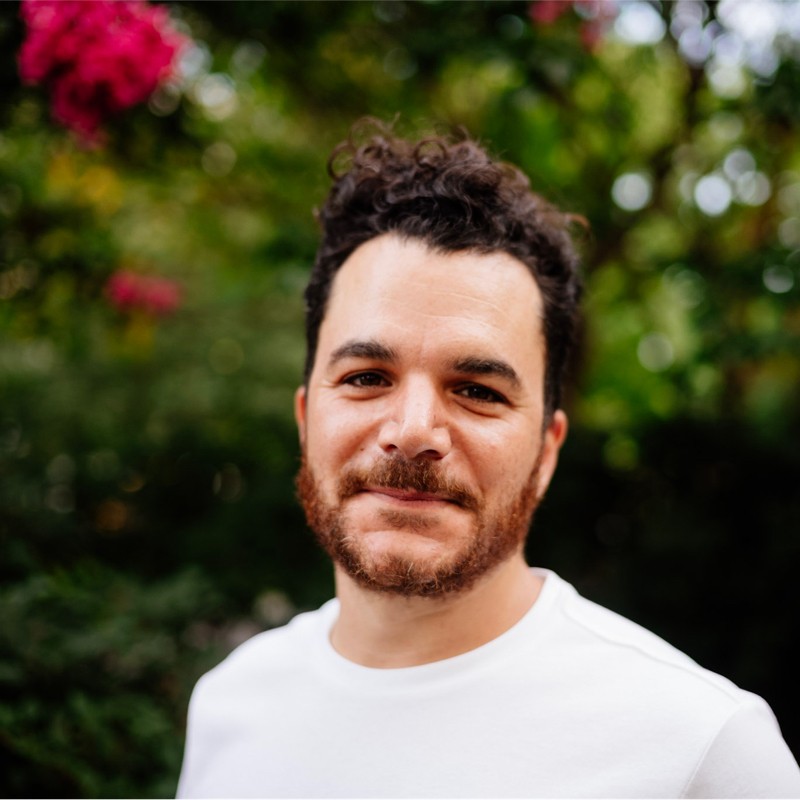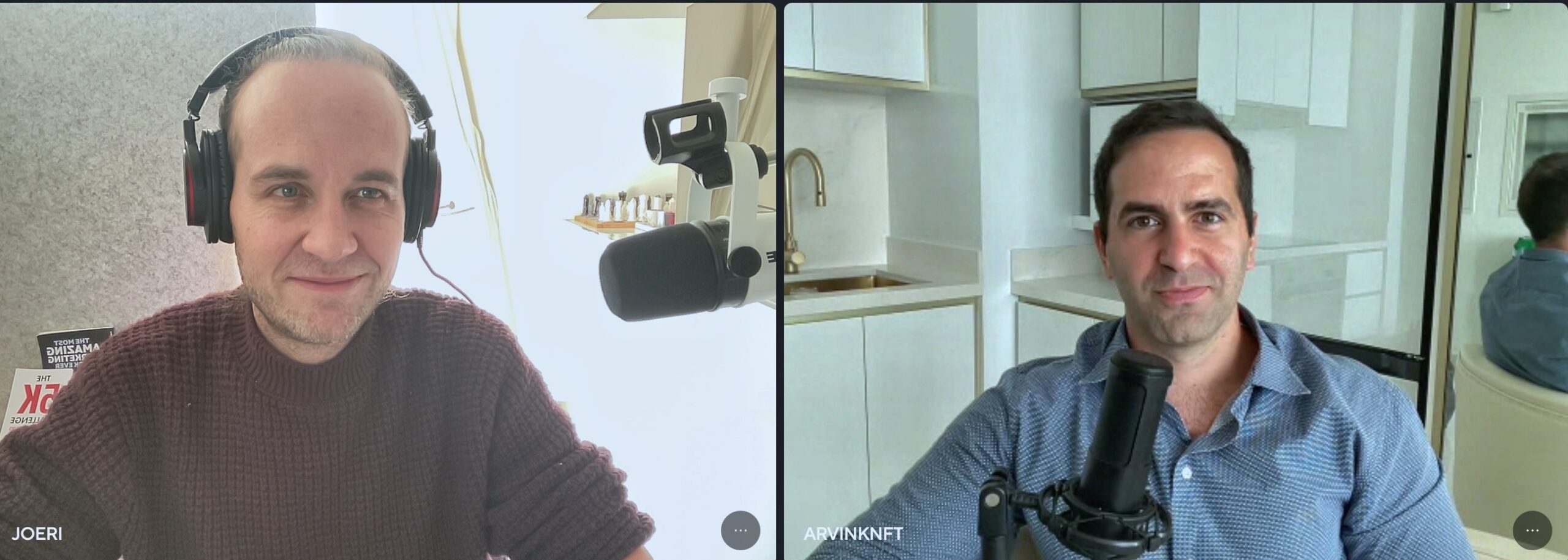What if blockchain could not only revolutionize finance but also transform how we communicate online?
Join us for an eye-opening conversation with Ben Rubin, the innovative mind behind Meerkat and Houseparty, as he shifts his focus to creating digital spaces that prioritize human connection and community.
From his early days in architecture school to the development of his latest venture, Towns, Ben shares valuable insights and hard-earned lessons. Learn how his journey from physical to digital architecture has influenced his approach to building platforms designed for interaction and connection.
In this episode, we delve into the intricate ways blockchain technology can enhance trust and accountability in online interactions. Ben explains how introducing cryptographic proofs and ownership stakes can create more reliable and sustainable digital environments.
We also compare the unique features of Towns with platforms like Discord, focusing on the promise of user-owned, transparent, and secure communities. Don't miss out on the excitement around the upcoming launch phases of Towns and the River protocol, and discover how these innovations could reshape the future of online community building.
Exploring the Future of Decentralized Communities with Towns
Welcome to another captivating episode of the Web CMO Stories podcast! Today, we delve into the exciting world of decentralized communities and the innovative platform, Towns. Our guest, Ben Rubin, shares his vision and insights into this groundbreaking project.
Ben Rubin, the co-founder and CEO of Towns, has a remarkable background in blockchain technology and decentralized systems. With a deep understanding of the challenges faced by online communities, he recognized the need for a more secure and transparent platform. This realization led to the creation of Towns, a decentralized community platform built on the River protocol.
Towns aims to revolutionize the way we interact and engage within online communities. By leveraging the power of blockchain technology, it offers a secure and transparent environment where users can truly own their digital identities and assets. Ben's passion for this project is palpable, and his explanations provide a clear understanding of the principles behind Towns and the River protocol.
One of the fascinating aspects of Ben's journey is his background in architecture. As an architect by training, he developed a deep understanding of how physical spaces shape human interactions and experiences. However, as the world became increasingly digital, Ben recognized the need to translate these principles into the virtual realm.
In our conversation, Ben shares how his architectural background influenced his approach to building digital spaces. He emphasizes the importance of creating environments that foster meaningful connections and facilitate seamless interactions among users. Just as physical spaces are designed with specific purposes and user experiences in mind, Ben and his team at Towns strive to create digital spaces that cater to the unique needs of online communities.
"As an architect, I learned that the spaces we inhabit profoundly shape our experiences and interactions. With Towns, we're applying those principles to the digital realm, creating virtual spaces that foster genuine human connections and enable communities to thrive."
Ben's vision for Towns goes beyond mere functionality; it encompasses the creation of digital spaces that evoke a sense of belonging and ownership. By leveraging the power of blockchain technology and the River protocol, Towns empowers users to truly own their digital identities and assets within these virtual spaces. This ownership paradigm represents a significant shift from traditional online platforms, where users often feel like mere tenants or consumers.
Designing for Human Interaction
One of the core principles guiding the development of Towns is the emphasis on human interaction. Ben recognizes that online communities thrive when members can engage with one another in meaningful ways. As such, the platform is designed to facilitate seamless communication, collaboration, and shared experiences.
Ben explains, "We're not just building a platform; we're creating digital spaces that foster genuine human connections. Just as architects design physical spaces with specific purposes in mind, we're designing virtual environments that cater to the unique needs of online communities."
By combining his architectural expertise with cutting-edge blockchain technology, Ben and the Towns team are paving the way for a new era of decentralized communities. As we continue our exploration of this innovative platform, we gain valuable insights into the future of online interactions and the potential for truly decentralized, user-owned digital spaces.
Lessons from Meerkat and Houseparty
Ben's journey with Towns is shaped by the valuable lessons he learned from his previous ventures, Meerkat and Houseparty. These experiences highlighted the importance of open networks and user ownership, which ultimately influenced the development of Towns.
With Meerkat, a live-streaming platform that gained significant traction in 2015, Ben encountered the challenges of relying on closed APIs. Despite adhering to the guidelines, Twitter shut down Meerkat's access to their API, effectively stifling the platform's growth. This experience underscored the need for open networks that foster innovation and inclusivity.
"The Meerkat experience taught me the importance of open networks and why a permissionless network is a step forward in building an Internet motivated by courage, not fear, and by inclusivity."
On the other hand, Houseparty, a group video chat app with over 50 million users, presented a different set of lessons. Despite the founders' vision to pivot the platform towards remote work capabilities, the board rejected the idea and opted to sell the company. This decision went against the will of the users and the founders, resulting in a less favorable outcome for all stakeholders.
Ben reflects, "Had we followed the will of the people and the founders, the story of Houseparty would have been different. This experience highlighted the importance of a network that is not only open but also owned by the users who participate in it."
The Power of Blockchain and Decentralization
Drawing from these lessons, Ben recognized the potential of blockchain technology to address the challenges of trust, security, and ownership in online communities. By leveraging blockchain, Towns aims to create a decentralized platform where users can truly own their digital identities and assets.
"Blockchain technology affords us a new dimension – ownership and accountability," Ben explains. "Once there is ownership, there is inherent accountability. If you have something that can be taken away, that means you have agreed to engage in a form of trust."
This concept of ownership and accountability is central to Towns' mission of fostering productive and sustainable online interactions. By aligning incentives and establishing a transparent system of trust, Towns aims to create an environment where meaningful information can thrive, free from the manipulation and augmentation that plague traditional online platforms.
Building in Public and Nurturing Community
One of the key strategies employed by Ben and the Towns team is building in public. This approach involves actively engaging with the community, seeking feedback, and incorporating their opinions into the development process. By fostering a sense of ownership and involvement, Towns cultivates a passionate and dedicated user base.
Ben emphasizes the importance of showing up consistently, both in good times and challenging periods. "We've been live streaming and hosting AMAs every week for two and a half years," he shares. "Through the ups and downs, we're there, answering questions, being transparent, and building trust with our community."
This commitment to transparency and open communication has been instrumental in nurturing a vibrant community around Towns. Ben acknowledges that while it's not easy, showing up authentically and addressing concerns head-on is crucial for fostering long-term relationships and cultivating a culture of passion and dedication.
As we explore the future of decentralized communities with Towns, it becomes clear that Ben's vision extends far beyond mere technology. It encompasses a fundamental shift in how we perceive and engage with online spaces, fostering genuine human connections, ownership, and trust through the power of blockchain and decentralization.
Leveraging Blockchain for Trust and Security
In our rapidly evolving digital landscape, the state of online communication presents both opportunities and challenges. While the internet has facilitated unprecedented connectivity and information exchange, it has also exposed vulnerabilities in terms of trust, security, and accountability.
Ben recognizes that the current state of online communication is characterized by a complex web of nodes (participants) and graphs (connections), whether they are broadcast graphs, friend graphs, or contact list graphs. However, what has been lacking is a robust mechanism to establish trust and accountability within these networks.
"Blockchain technology affords us a new dimension to add instead of just dots and connections – a third dimension that addresses what is at stake, who owns it, and what is the stake."
By introducing the concept of ownership and accountability, blockchain technology has the potential to revolutionize online communication. When users have a tangible stake in the network, it fosters a sense of responsibility and trust, as actions can have real consequences.
Adding Trust through Blockchain
Ben explains that the key to meaningful and sustainable online interactions lies in aligning incentives and fostering trust. Blockchain technology provides a solution by introducing a layer of ownership and accountability that has been missing from traditional online platforms.
"Once there is ownership, there is inherent accountability," Ben states. "If you have something that can be taken away, that means you have agreed to engage in a form of trust."
This concept of ownership and accountability is particularly relevant in the context of online communication, where the spread of misinformation and manipulation has become a pressing concern. By creating a system where users have a tangible stake in the network, blockchain technology incentivizes responsible behavior and discourages malicious activities.
Practical Use Cases of Blockchain in Communication
The applications of blockchain technology in online communication are vast and diverse. One potential use case is the creation of decentralized social media platforms, where users truly own their data and content. This could mitigate the issues of censorship, data privacy violations, and algorithmic manipulation that plague traditional social media giants.
Another application could be in the realm of online collaboration and remote work. Blockchain-based platforms could facilitate secure and transparent communication, file sharing, and task management, fostering trust and accountability among team members and stakeholders.
Additionally, blockchain technology could revolutionize the way we approach online voting and decision-making processes. By leveraging the principles of decentralization and transparency, blockchain-based voting systems could ensure the integrity of elections and empower communities to make informed decisions.
As Ben and the Towns team continue to explore the potential of blockchain technology in online communication, they are paving the way for a future where trust, security, and accountability are inherent features of our digital interactions. By aligning incentives and fostering a sense of ownership, blockchain technology holds the promise of creating a more productive and sustainable online ecosystem.
Differentiating Towns from Existing Platforms
While Towns may share some surface-level similarities with platforms like Discord, its underlying architecture and philosophy set it apart. Ben emphasizes that Towns is designed to address the limitations of traditional online communities by leveraging blockchain technology and decentralization.
"In Discord, you essentially rent a space as a community," Ben explains. "You don't own your space, and Discord was built specifically to support gamers. For communities with broader goals beyond just coordinating gameplay, Towns offers a different value proposition."
Ownership and Programmable Spaces
One of the key differentiators of Towns is the concept of ownership. Unlike centralized platforms where a single entity dictates the rules, Towns is built on a permissionless protocol called River, which is owned and operated by the groups that run it. This decentralized approach empowers communities to truly own their digital spaces and shape their destinies.
Furthermore, every town on the platform is a smart contract, issuing memberships and enabling programmable spaces. Ben elaborates, "You can create specific use cases about who can read, who can write, and under what circumstances. This level of programmability allows communities to tailor their online spaces to their unique needs and values."
Transparency and Accountability
Transparency and accountability are core tenets of Towns. By leveraging blockchain technology, the platform offers unprecedented visibility into various aspects of community management. Users can trace the minting of channels, roles, and even the flow of subscription payments, fostering trust and accountability among members.
"Your community can actually see where the subscription money goes, how it trickles down to different moderators and participants," Ben explains. "There's a lot of transparency around it, which creates accountability between the members and the space facilitators."
End-to-End Encryption
Privacy and security are paramount in the decentralized world of Towns. To safeguard user data and communications, the platform employs end-to-end encryption. This ensures that even in a permissionless network owned and governed by its users, individual privacy is protected.
Ben emphasizes, "It's really important for a network that is permissionless and owned and governed by its users to have end-to-end encryption, ensuring that your privacy is protected while still allowing for the transparency and accountability that blockchain technology provides."
By combining ownership, programmability, transparency, and robust security measures, Towns aims to create a fundamentally different and more meaningful online experience. Users can trust the participants, transparently observe the flow of value, and enjoy the benefits of a decentralized, community-driven platform that aligns incentives and fosters productive interactions.
Conclusion
As we conclude our exploration of Towns and the potential of blockchain technology in online communication, it's clear that we are witnessing the dawn of a new era. The limitations and challenges of traditional centralized platforms have paved the way for innovative solutions that prioritize trust, security, and accountability.
Recap of Key Points
Throughout our discussion, several key points have emerged:
Ownership and Accountability: By introducing the concept of ownership and tangible stakes, blockchain technology fosters a sense of responsibility and accountability among participants in online communities.
Programmable Spaces: Towns' smart contract-based architecture allows communities to create programmable spaces tailored to their unique needs, enabling granular control over access, roles, and interactions.
Transparency and Trust: The decentralized and transparent nature of blockchain technology ensures that community members can trace the flow of value, fostering trust and accountability among participants and facilitators.
Privacy and Security: End-to-end encryption safeguards user data and communications, striking a balance between transparency and individual privacy in a permissionless network.
Future of Digital Communication
As we look ahead, the future of digital communication appears to be one where decentralization, ownership, and community governance take center stage. Traditional centralized platforms may face increasing scrutiny and competition from decentralized alternatives that empower users and align incentives.
Ben envisions a world where online communities can thrive in truly owned and programmable spaces, free from the constraints and limitations of centralized platforms. "We're creating a new paradigm where communities can shape their own destinies, foster trust and accountability, and engage in meaningful interactions without the looming threat of censorship or manipulation," he says.
Final Thoughts from Ben Rubin
In closing, Ben Rubin shares his vision for the future of digital communication and the role that Towns aims to play:
"At Towns, we're not just building another platform; we're laying the foundation for a new era of online interaction. By leveraging the power of blockchain technology, we're empowering communities to take ownership of their digital spaces, fostering trust and accountability in a way that has never been possible before.
This is just the beginning. As we continue to push the boundaries of what's possible, we envision a future where online communities can thrive in truly decentralized and programmable environments, free from the constraints of centralized platforms. It's an exciting time, and we're proud to be at the forefront of this revolution."
As we embark on this journey towards a more transparent, secure, and community-driven digital landscape, the potential for meaningful and productive online interactions has never been greater. With innovators like Ben Rubin and the Towns team leading the charge, the future of digital communication promises to be one of empowerment, trust, and accountability.
Introducing the River Protocol and Towns
As we delve deeper into the world of decentralized online communities, Ben introduces us to the River Protocol and Towns, two groundbreaking projects that aim to revolutionize digital communication.
The River Protocol: The Backbone of Decentralized Communities
The River Protocol is the foundational layer that underpins Towns and other decentralized applications. Ben describes it as "the back end of Towns" and an "open protocol" that enables the creation of programmable spaces tailored to specific use cases.
"The River Protocol can look at any on-chain footprint on any EVM-compatible chain and allow people creating spaces to create programmable spaces based on their use case," Ben explains. "It could be an oracle that looks at certain actions users have taken, or it could be a straightforward gating by a certain asset, like an NFT."
The River Protocol's ability to interact with various blockchain ecosystems and on-chain data opens up a world of possibilities for building customized, decentralized communities with unique access and participation rules.
Towns: A Decentralized Community Platform
Built on top of the River Protocol, Towns is a decentralized community platform that aims to redefine how we interact and collaborate online. Ben describes Towns as "one client for the River Protocol," emphasizing its role as a user-friendly interface for accessing the underlying decentralized infrastructure.
"Towns really allows communities to own their destiny and own their value," Ben says. "Every town is a smart contract that issues memberships, and you can create specific use cases about who can read, who can write, and under what circumstances."
By leveraging blockchain technology and smart contracts, Towns empowers communities to establish their own rules, governance structures, and access controls, fostering a sense of ownership and accountability among members.
Current Status and Testnet Phase
The River Protocol and Towns are currently in an advanced stage of development. Ben proudly shares that the River Protocol is already operational on the testnet, with various nodes actively participating in the decentralized network.
"If you go to river.build/status, you can see the different nodes that are operating on the testnet," Ben says. "We also onboarded successfully external node operators, which is a really important milestone where you're trying to build a decentralized network."
This testnet phase has been crucial for stress-testing the protocol, identifying potential issues, and ensuring a smooth transition to the mainnet launch.
Transition to Mainnet and Launch Partners
With the testnet phase nearing completion, the River Protocol is poised for its mainnet launch within the next few weeks. Ben shares the exciting news that the team has already begun onboarding launch partner communities to test and provide feedback on the platform.
"The protocol part that supports Towns is going to be live at that point," Ben says. "We're going to start testing with specific launch partner communities for a few weeks to potentially a month or so. And somewhere in the summer, hopefully, if everything goes right, Towns will be launched."
The anticipation is palpable as the team prepares for the mainnet launch and the subsequent rollout of Towns to the broader public. This milestone represents a significant step towards realizing the vision of decentralized, community-driven online spaces powered by blockchain technology.
Key Milestones and Launch Timeline
As the River Protocol and Towns approach their highly anticipated launch, Ben shares some key milestones and the projected timeline for the rollout.
Successful Onboarding of External Node Operators
One of the critical milestones achieved during the testnet phase was the successful onboarding of external node operators. This step is crucial in building a truly decentralized network, as it ensures that the protocol is not solely reliant on a single entity or group.
"We onboarded successfully external node operators, which is a really important milestone where you're trying to build a decentralized network," Ben explains. "If you go to river.build/status, you can see the different nodes that are operating on the testnet."
By involving external parties in the operation and validation of the network, the River Protocol takes a significant step towards achieving true decentralization and fostering a robust, resilient ecosystem.
Testnet Conclusion and Mainnet Launch
After an extensive testnet phase, during which the protocol underwent rigorous stress testing and evaluation, the River Protocol is poised for its mainnet launch within the next few weeks. This milestone marks a pivotal moment in the project's journey, signaling the transition from a controlled testing environment to a live, production-ready network.
"The protocol part that supports Towns is going to be live at that point," Ben confirms, referring to the mainnet launch.
The successful completion of the testnet phase and the subsequent mainnet launch will pave the way for the broader adoption and real-world implementation of the River Protocol and its associated applications, such as Towns.
Testing with Launch Partner Communities
While the mainnet launch is a significant achievement, the team at Towns recognizes the importance of thorough testing and community feedback. To ensure a smooth and successful rollout, they have already begun onboarding launch partner communities to test and provide valuable insights on the platform.
"We're going to start testing with specific launch partner communities for a few weeks to potentially a month or so," Ben explains. "This will allow us to gather feedback, identify any potential issues, and make necessary adjustments before the broader public launch."
By collaborating closely with these early adopter communities, the Towns team aims to refine the platform, address any concerns, and ensure that it meets the diverse needs and expectations of its users.
Expected Public Launch Timeline
With the mainnet launch and the testing phase with launch partner communities underway, the team is optimistic about the public launch of Towns in the coming months.
"Somewhere in the summer, hopefully, if everything goes right, Towns will be launched," Ben says, expressing cautious optimism about the projected timeline.
The public launch of Towns will mark a significant milestone in the journey towards decentralized, community-driven online spaces. It will open the doors for a broader audience to experience the power of blockchain technology in shaping their digital interactions and fostering a sense of ownership and accountability within their communities.
Engaging with Towns and the River Protocol
As the launch of Towns and the River Protocol draws near, Ben shares some valuable insights on how interested individuals and communities can stay informed and get involved with these groundbreaking projects.
Following Towns XYZ on Twitter
For those eager to stay up-to-date with the latest developments and announcements surrounding Towns, Ben recommends following the official @TownsXYZ Twitter account. "We're constantly posting updates there," he says, emphasizing the importance of this social media channel for real-time information and community engagement.
Signing Up for the River Build Newsletter
If you're a developer or someone deeply interested in understanding the technical intricacies of the River Protocol, Ben suggests signing up for the River Build newsletter. "If you are a developer and want to understand how the River Protocol works, which is a week or two from being on mainnet, then we have river.build, and you can go and sign up to the newsletter," he explains.
By subscribing to the newsletter, you'll gain access to valuable insights, technical updates, and developer resources, enabling you to stay ahead of the curve and explore the potential of the River Protocol.
Developer Resources and Community Involvement
Beyond following social media channels and newsletters, Ben emphasizes the importance of community involvement and developer resources. As an open-source project, the River Protocol and Towns rely on the collective efforts of developers, researchers, and enthusiasts to drive innovation and foster a thriving ecosystem.
"If you are a developer and are interested in contributing to the project or exploring the potential of the River Protocol, we welcome your involvement," Ben says. "Our team is committed to providing comprehensive documentation, developer tools, and support to empower the community to build upon our foundation."
By actively engaging with the developer community, sharing knowledge, and collaborating on new ideas, individuals can play a pivotal role in shaping the future of decentralized online communities powered by the River Protocol and Towns.
Staying Updated with Latest Developments
As the launch dates for the River Protocol and Towns approach, Ben encourages everyone to stay tuned for the latest updates and announcements. "This is a rapidly evolving space, and we're committed to keeping our community informed every step of the way," he says.
Whether through social media channels, newsletters, or direct community engagement, the team behind Towns and the River Protocol is dedicated to maintaining open lines of communication, addressing concerns, and fostering a transparent and inclusive environment for all stakeholders.
With the imminent launch of these groundbreaking projects, the future of decentralized online communities has never been more exciting. By embracing the principles of decentralization, transparency, and community ownership, Towns and the River Protocol are poised to revolutionize the way we interact, collaborate, and build value together in the digital realm.
Practical Steps for Getting Involved
As the River Protocol and Towns approach their highly anticipated launch, there are several practical steps that interested individuals and communities can take to get involved and contribute to the success of these groundbreaking projects.
Participating in the Testnet
One of the most direct ways to engage with the River Protocol and Towns is by participating in the ongoing testnet phase. This phase serves as a crucial testing ground, allowing developers, researchers, and enthusiasts to explore the platform's features, identify potential issues, and provide valuable feedback to the development team.
To participate in the testnet, you can visit river.build/status, where you'll find information on the different nodes operating on the testnet. By interacting with these nodes and experimenting with the platform's functionalities, you can gain first-hand experience and contribute to the refinement of the River Protocol and Towns.
Preparing for the Mainnet Launch
As the mainnet launch approaches, it's essential to stay informed and prepare for the transition from the testnet to the live, production-ready network. This preparation may involve setting up the necessary infrastructure, familiarizing yourself with the updated documentation, and ensuring compatibility with the latest protocol updates.
By actively engaging with the developer community, attending workshops or webinars, and staying up-to-date with the latest announcements, you can ensure a smooth transition and be among the first to leverage the full potential of the River Protocol and Towns on the mainnet.
Engaging with Launch Partner Communities
As mentioned earlier, the Towns team is actively onboarding launch partner communities to test and provide feedback on the platform. If you're part of an existing community or interested in forming a new one, this presents an excellent opportunity to get involved and shape the future of decentralized online spaces.
By participating in these early testing phases, you can not only contribute valuable insights but also gain a deeper understanding of the platform's capabilities and how it can be tailored to meet the unique needs of your community.
Providing Feedback and Contributing to Development
One of the core principles of the River Protocol and Towns is fostering an open and collaborative ecosystem. As such, the development team actively encourages feedback, bug reports, and contributions from the community.
Whether you're a developer, researcher, or an enthusiastic user, your input can play a crucial role in refining the platform, identifying potential improvements, and driving innovation. By engaging with the project's communication channels, such as forums, GitHub repositories, or dedicated feedback channels, you can share your insights and contribute to the ongoing development efforts.
Additionally, for those with technical expertise, the open-source nature of the River Protocol and Towns presents opportunities for direct code contributions, documentation improvements, and the development of complementary tools or applications that enhance the overall ecosystem.
By actively participating in the various stages of development, testing, and community engagement, you can not only shape the future of decentralized online spaces but also gain valuable experience and insights into the cutting-edge world of blockchain technology and decentralized applications.
Conclusion and Call to Action
As we approach the highly anticipated launch of the River Protocol and Towns, the excitement and potential for transformative change in the realm of decentralized online communities are palpable. These groundbreaking projects represent a paradigm shift, empowering individuals and communities to take control of their digital spaces, fostering transparency, ownership, and true collaboration.
Recap of Key Points
Throughout our discussion, we've explored the practical steps that interested individuals and communities can take to get involved and contribute to the success of these initiatives. From participating in the ongoing testnet phase to preparing for the mainnet launch, engaging with launch partner communities, and providing valuable feedback and contributions, the opportunities for active involvement are abundant.
By embracing the principles of decentralization, transparency, and community ownership, the River Protocol and Towns are poised to revolutionize the way we interact, collaborate, and build value together in the digital realm. The power lies in our collective efforts, and the success of these projects hinges on the active participation and contributions of a vibrant and engaged community.
Importance of Community Involvement
As we've discussed, the River Protocol and Towns are open-source projects, relying on the collective efforts of developers, researchers, and enthusiasts to drive innovation and foster a thriving ecosystem. Your involvement is not only welcomed but essential to the long-term success and evolution of these platforms.
By actively engaging with the developer community, sharing knowledge, and collaborating on new ideas, you can play a pivotal role in shaping the future of decentralized online communities. Your insights, feedback, and contributions have the potential to influence the direction of these projects, ensuring they meet the diverse needs of communities worldwide.
Encouraging Listener Participation
If you're listening to this and feel inspired to be part of this transformative movement, I encourage you to take action. Follow the official @TownsXYZ Twitter account for the latest updates, sign up for the River Build newsletter to stay informed about technical developments, and explore the various opportunities for community involvement.
Whether you're a developer, researcher, community leader, or simply an enthusiast, your participation is invaluable. Together, we can shape the future of decentralized online spaces, fostering a more transparent, inclusive, and empowering digital landscape for all.
Final Thoughts and Next Steps
As we conclude our discussion, I want to leave you with a sense of excitement and anticipation for what's to come. The launch of the River Protocol and Towns is not just a technological milestone; it's a testament to the power of community-driven innovation and the potential for transformative change.
Stay tuned for the latest updates, announcements, and opportunities to get involved. Together, we can unlock the full potential of decentralized online communities and create a digital landscape that truly reflects our values of transparency, ownership, and collaboration.
The future is decentralized, and it starts with each one of us taking action. Let's embark on this journey together and shape the digital world we want to see.
Conclusion and Call to Action
As we approach the highly anticipated launch of the River Protocol and Towns, the excitement and potential for transformative change in the realm of decentralized online communities are palpable. These groundbreaking projects represent a paradigm shift, empowering individuals and communities to take control of their digital spaces, fostering transparency, ownership, and true collaboration.
Recap of Key Points
Throughout our discussion, we've explored the practical steps that interested individuals and communities can take to get involved and contribute to the success of these initiatives. From participating in the ongoing testnet phase to preparing for the mainnet launch, engaging with launch partner communities, and providing valuable feedback and contributions, the opportunities for active involvement are abundant.
By embracing the principles of decentralization, transparency, and community ownership, the River Protocol and Towns are poised to revolutionize the way we interact, collaborate, and build value together in the digital realm. The power lies in our collective efforts, and the success of these projects hinges on the active participation and contributions of a vibrant and engaged community.
Importance of Community Involvement
As we've discussed, the River Protocol and Towns are open-source projects, relying on the collective efforts of developers, researchers, and enthusiasts to drive innovation and foster a thriving ecosystem. Your involvement is not only welcomed but essential to the long-term success and evolution of these platforms.
By actively engaging with the developer community, sharing knowledge, and collaborating on new ideas, you can play a pivotal role in shaping the future of decentralized online communities. Your insights, feedback, and contributions have the potential to influence the direction of these projects, ensuring they meet the diverse needs of communities worldwide.
Encouraging Listener Participation
If you're listening to this and feel inspired to be part of this transformative movement, I encourage you to take action. Follow the official @TownsXYZ Twitter account for the latest updates, sign up for the River Build newsletter to stay informed about technical developments, and explore the various opportunities for community involvement.
Whether you're a developer, researcher, community leader, or simply an enthusiast, your participation is invaluable. Together, we can shape the future of decentralized online spaces, fostering a more transparent, inclusive, and empowering digital landscape for all.
Final Thoughts and Next Steps
As we conclude our discussion, I want to leave you with a sense of excitement and anticipation for what's to come. The launch of the River Protocol and Towns is not just a technological milestone; it's a testament to the power of community-driven innovation and the potential for transformative change.
Stay tuned for the latest updates, announcements, and opportunities to get involved. Together, we can unlock the full potential of decentralized online communities and create a digital landscape that truly reflects our values of transparency, ownership, and collaboration.
The future is decentralized, and it starts with each one of us taking action. Let's embark on this journey together and shape the digital world we want to see.

Ben Rubin
KEY HIGHLIGHTS
[01:14] How did your background in architecture influence your approach to creating digital platforms, and how has your approach evolved since then?
[04:38] Given your history with Meerkat and Houseparty, what were some of the lessons you learned from that period before moving on to Towns?
[09:44] Could you explain blockchain in simpler terms for those who are just getting started?
[16:53] Does the whole NFT thing play a part in Towns?
[18:05] How are Discord communities different from Towns?
[21:18] Is Towns available now, or when will it be available? What is its current status?
NOTABLE QUOTES
“Maybe there's a new type of material to build buildings for, and buildings don't have to be physical. Maybe you can build buildings for users that are not inside of them. “
“One of my biggest lessons from Meerkat was about being a builder and understanding why an open network and a permissionless network is really a step forward in building an Internet motivated by courage and not by fear.”
“The importance of a network that is not only open but also owned by its users. This ensures that users have a stake in it and can trust it.”
“Once there is ownership, there is accountability. If you have something and it can be taken away, that means we have inherent accountability.”
“The value you're created is actually something you can take with you.”
MENTIONED RESOURCES
Towns Website: https://www.towns.com/
Towns Twitter: https://x.com/townsxyz
River Protocol: https://www.river.build/
River Protocol Twitter: https://x.com/buildonriver
CONNECT
Twitter: https://x.com/benrbn






